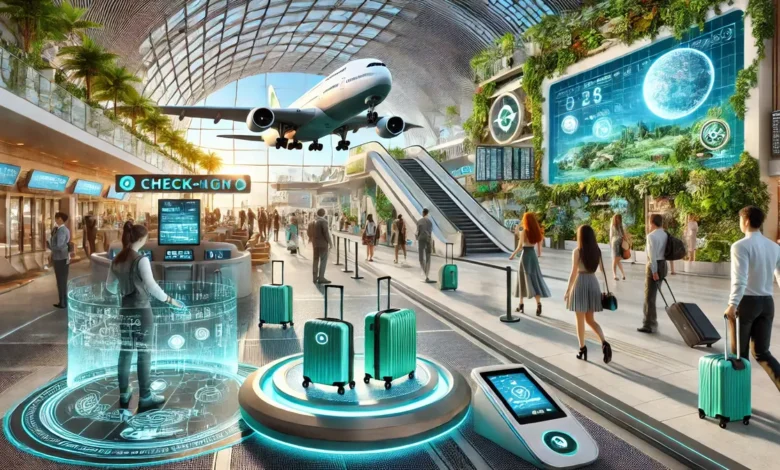TravelsForNow.com: The Future of Travel – Trends to Watch in the Next Decade

Introduction:
In the ever-evolving world of travel, staying ahead of trends is not just advantageous—it’s essential. As we look towards the next decade, TravelsForNow.com is at the forefront, analyzing shifts in technology, sustainability, and traveler preferences. This article dives into the emerging trends that will reshape the travel industry, offering insights for both consumers and businesses aiming to stay relevant in a dynamic market.
I. Technological Innovations Transforming Travel

A. Biometric Technology for Enhanced Security and Efficiency
The TravelsForNow.com future of travel will see an increased integration of biometric technology. Airports and hotels are already experimenting with facial recognition and fingerprint scanning to speed up check-in processes and enhance security measures. By 2030, these technologies will become standard, streamlining traveler verification and reducing wait times significantly.
B. The Rise of Smart Luggage
Smart luggage, equipped with features like GPS locators, USB ports, and electronic locks, is making travel more secure and convenient. The next decade will bring more innovations in luggage, including self-moving suitcases and enhanced battery life for mobile charging.
C. Virtual Reality (VR) and Augmented Reality (AR) Enhancements
VR and AR are set to transform how travelers select destinations and accommodations. TravelsForNow.com predicts that by 2025, virtual tours will be a primary tool for vacation planning, allowing travelers to explore accommodations and local attractions digitally before booking their trips.
II. Sustainability: A Core Focus for Future Travel
A. Eco-Friendly Travel Options As environmental concerns continue to gain urgency, the travel industry is responding with greener options. This includes the development of more efficient aircraft, eco-friendly hotels, and the promotion of destinations that offer sustainable tourism experiences.
B. Carbon Offsetting and Sustainability Certifications TravelsForNow.com expects a significant rise in travel services offering carbon offset options. Additionally, sustainability certifications will become a major factor in consumer choices, influencing where they decide to spend their travel dollars.
C. Conservation-Focused Tourism Conservation tourism, which supports the preservation of wildlife and natural habitats, will see a boost. Travel packages that include conservation activities, such as reforestation projects or wildlife tracking, will become increasingly popular among eco-conscious travelers.
III. Shifts in Traveler Behavior and Preferences
A. The Demand for Personalization Travelers are seeking highly personalized experiences tailored to their interests and needs. This trend will drive the adoption of AI and machine learning in travel planning, providing customized itineraries based on traveler data.
B. The Rise of Bleisure Travel (Business + Leisure) The blending of business and leisure travel, or ‘leisure,’ is on the rise. Professionals are increasingly extending business trips to include leisure activities, a trend that will continue to grow as remote work and digital nomadism become more prevalent.
C. Off-the-Beaten-Path Destinations Travelers are increasingly avoiding crowded tourist spots in favor of less-known destinations. This shift is driven by a desire for unique, authentic experiences and the availability of more reliable, off-the-grid accommodations thanks to technology.
IV. Economic Trends Impacting Travel
A. The Role of Cryptocurrency in Travel Cryptocurrencies and blockchain technology are making headway in the travel industry, offering new ways to book and pay for travel. TravelsForNow.com forecasts that by the end of the decade, many travel providers will accept digital currencies as standard payment methods.
B. Dynamic Pricing Models Dynamic pricing algorithms, which adjust prices in real-time based on demand, are becoming more sophisticated. This model not only benefits consumers, who can take advantage of lower prices during off-peak times, but also helps businesses maximize revenue.
Conclusion: The next decade promises revolutionary changes in the travel industry, driven by technological advances, sustainability, changing consumer behaviors, and economic factors. For businesses and travelers alike, staying informed about these trends is crucial for capitalizing on the opportunities of tomorrow. Keep an eye on TravelsForNow.com as your guide to navigating the exciting future of travel.
FAQS
What are the main technological innovations expected to transform travel in the next decade?
In the next decade, travel will be significantly influenced by advancements in biometric technology, smart luggage, and the integration of virtual reality (VR) and augmented reality (AR) into the planning and booking processes. These technologies aim to enhance security, increase convenience, and provide immersive experiences for travelers.
How is the travel industry addressing environmental sustainability?
The travel industry is increasingly focusing on sustainability by developing more eco-friendly travel options, including more efficient aircraft and sustainable hotel practices. Additionally, more travel providers are offering carbon-offsetting opportunities and prioritizing destinations that facilitate conservation tourism to protect natural habitats and wildlife.
What is leisure travel, and why is it becoming popular?
Bleisure travel combines business and leisure activities into one trip. This trend is growing due to the flexibility offered by remote work and the increase in professionals seeking to enrich their travel experiences by extending business trips for leisure purposes. It reflects a broader shift towards a more integrated lifestyle approach to work and play.
How will cryptocurrency influence future travel transactions?
Cryptocurrency is set to play a significant role in travel by providing a new, secure way to pay for travel services. The use of blockchain technology ensures safe and transparent transactions, potentially reducing fees and streamlining booking processes. By the end of the next decade, many travel businesses are expected to accept digital currencies as standard payment options.
What are dynamic pricing models, and how do they benefit consumers and businesses?
Dynamic pricing models use algorithms to adjust the prices of travel services in real time based on demand. This benefits consumers by allowing them to access lower prices during off-peak periods, while businesses can maximize revenue by adjusting prices based on the current market demand. These models make pricing more responsive and efficient for both parties.

